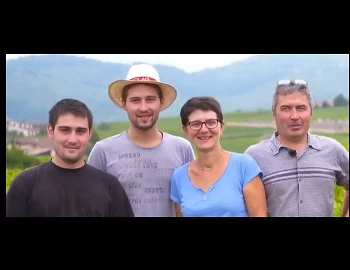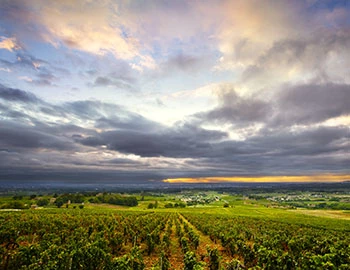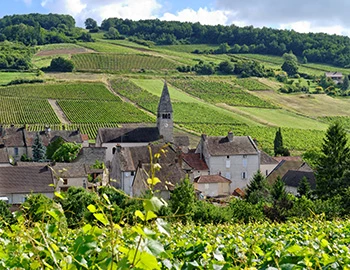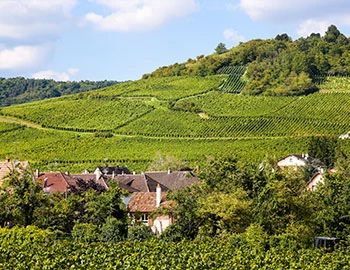
Fleurie Vieilles Vignes 2022
AC, Domaine Laurent Perrachon et Fils, 750 ml

| Grape variety: | Gamay |
| Producer: | Domaine Laurent Perrachon & Fils |
| Origin: | France / Bourgogne / Beaujolais |
Description
A charming wine, floral-fruity and elegant. It smells of violets, peonies and cherries. It has grown on the vineyard La Cadole in the famous location La Madone. Its rather mild tannin structure and fresh acidity make it a lively wine with a wonderful drinking flow.
Attributes
| Origin: | France / Bourgogne / Beaujolais |
| Grape variety: | Gamay |
| Ripening potential: | 1 to 6 years |
| Drinking temperature: | 16 to 18 °C |
| Food Pairing: | Coq au vin, Succulent chicken breast with cream sauc, Rabbit ragout with olives, Vegetable cous-cous, Mild Asian dishes |
| Vinification: | Punching down, Pumping over, partly destemmed |
| Harvest: | hand-picking, strict selection |
| Maturation: | in large wooden barrel/foudre |
| Maturation duration: | 10 months |
| Volume: | 13.0 % |
| Note: | Contains sulphites |
Domaine Laurent Perrachon & Fils
Since 1877 the family's own vineyards have been cultivated by the 5th and 6th generation.
Established in Juliénas in 1877, they are the 5th (Laurent and Martine) and 6th generation (Adrien and Maxime) to run the family vineyards. The estate now extends over 6 Beaujolais vineyards: Juliénas / Moulin à Vent / Morgon / Chénas / Fleurie and Saint-Amour and also in Beaujolais Villages. In 2019, the Perrachons acquired an additional 1.70 ha in Pouilly-Fuissé with 80-100 year old vines. They continue the work of their ancestors by upholding a time-honoured tradition, as the first mention of the PERRACHON family in the history of winegrowers in Juliénas dates back to 1601. The family works the traditional way, hand-picking, goblet and "cordon de royal" pruning. Their yield per vine is one of the lowest in France, but this guarantees the quality and authenticity of their wines: 8 appellations, 6 vineyards (Crus) in Beaujolais, Chénas, Fleurie, Juliénas, Morgon, Moulin-à-Vent and Saint Amour, our Beaujolais / Villages (red, rosé and white) and Pouilly-Fuissé. They also produce single-vineyard selections, from only the best plots of the estate on selected vineyards.

Beaujolais
Beaujolais: the lightness of being
Though it always features an alcohol content of between 12.5 and 13.5 percent by volume, Beaujolais, a varietal Gamay, is considered a light wine. With its fruity vibrancy, it is a sociable wine that harmonizes exquisitely with simple and classic cuisine. The southern part, Bas Beaujolais, produces simple, highly drinkable wines, while the crus from the northern Haut Beaujolais – which ripen on weathered granite – demonstrate substantially greater individual expression.

Bourgogne
Burgundy: home of the crus
Burgundy and Bordeaux are France’s most prestigious wine regions. Nonetheless, they are completely distinct in character: while Bordeaux, as the land of the chateaux, enjoys an aristocratic image, Burgundy has retained its rustic agrarian structure. Burgundy stretches for over 200 kilometres, from Dijon in the north to Lyon in the south. In a highly complex jigsaw of the most diverse of terroirs, Chardonnay and Pinot Noir demonstrate the subtle ways in which they embody their sources.

France
France – Philosophy in a bottle
According to French philosophy, wine should be an expression of the soil and climate. They use the word “terroir” to describe this. Terroir makes every wine different, and many especially good. French wine is regarded worldwide as an expression of cultural perfection. The French believe that humans are responsible for the quality of the berries, the vine variety for their character, and nature for the quantity. This philosophy can be expressed succinctly as: “the truth is the vineyard, not the man.”


